|
The inventories of 1339 These accounts are
our main source of information and are absolutely outstanding!
Their existence is quite epic: In 1339, the last Dauphin Humbert
II is broke. His only son died a few years ago and he wants to
sell his province to the Pope Benoit 12th (Remember that he is a
neighbor as he lives in Avignon). In order to assess the value
of his assets, he sends controllers in each of his castle to
measure the height, depth and width of each piece of wall or
tower to determine the volume of stones being used. Converted in
Florins, this will give the value of the castle. Wooden parts of
the castles like staircases, hoardings, roofs are barely
described as wood deteriorates quickly and doesn't have a real
trade value in these days. |
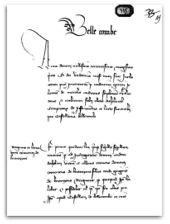 |
|
Ruins on the site
Many ruins can still be seen today, but their interpretation
can be difficult: Walls have been modified over the centuries
and the ruins may not represent the superstructures of the 14th
century. |
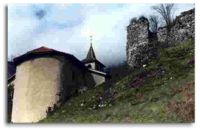 |
|
Plans from the Archeologic Center of Grenoble
All castle sites (with the exception of
Mont-Briton which
was discovered only in 2005 by a member of the Atelier) have
been mapped out and explored by archeologists. Their plans are
the most accurate source of information to assess the location
of the wall basements. |
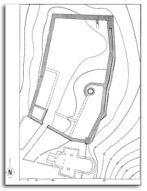 |
|
Old postcards
19th century postcards can be very helpful to view walls that
have destroyed since then. The postcard on the right shows the
aspect of the tower of
Avalon before being rebuilt by the Chartreux monks in the
late 19th century. |
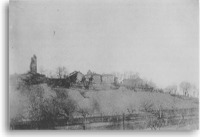 |
|
Old drawings
Master masons of the middle ages didn't use drawings to plan
their castles, so this source of information is very rare. The
drawing of Bellecombe castle on the right was made in the 15th
century. It was part of a parchemin describing the border
between Dauphiné and Savoy. The
basement of the
keep of Bellecombe is inspired from this drawing. |
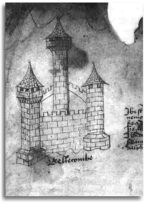 |
|
Old scholars
Many priests in the late 19th century or early 20th century
were fond of history and spent a humongous amount of time
translating old documents in Latin into modern French. The Abbé
Perrin (picture to the right) wrote the history of La Buissière,
the Abbé Bernard wrote the history of Bellecombe and Montmélian,
the Chanoine Chevalier compiled ALL the documents related
to Medieval Dauphiné in French: 40,000 texts that fill 7 large
books of 450 pages each! This masterpiece has just been scanned
and indexed recently by the National Library of France to
facilitate the researches. |
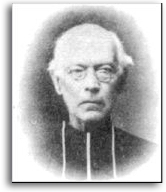 |